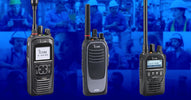
15 Myth-Busting Facts About Two-Way Radio Range
, by Jesus Moraga, 5 min reading time

, by Jesus Moraga, 5 min reading time
Understanding the range of two-way radios is essential for their effective use. However, misinformation can lead to inefficient communication or unmet expectations. This blog provides fifteen myth-busting facts about two-way radio range to ensure you fully understand the technology you are using.
The truth is that the environment dramatically affects the range. Urban areas with buildings and other obstructions can limit the radio’s signal, while open spaces, such as fields or deserts, will allow for a longer range. Therefore, considering where you will use the radio most frequently is crucial when shopping for two-way radios to ensure you choose the best model.
While higher frequencies can provide clearer communication, they are more susceptible to obstructions such as walls and buildings. On the other hand, lower frequencies can more effectively penetrate these obstacles, making them more reliable in certain environments. Therefore, understanding your environment’s specific needs is vital before selecting the frequency range.
Battery life can significantly impact your two-way radio’s effectiveness. The assumption that all radios have the same battery life is misleading. Factors such as the radio’s power output, usage patterns, and battery type can influence how long it will last on a single charge. For instance, high-power settings drain the battery faster. Knowing these variables can help you choose a model that suits your operational needs.
It is often believed that shelling out more money will automatically get you a radio with a better range. While high-end models come with advanced features and possibly better performance, the range is not solely dependent on price. Several mid-range and refurbished two-way radios offer excellent range at a fraction of the cost. Understanding the specifications and your actual needs can save you money while meeting your requirements.

While one of the benefits of two-way radios is their durability, not every two-way radio can withstand harsh weather conditions. Assuming all radios are weatherproof can lead to unexpected failures. Look for models with weatherproof ratings if you plan to use these devices in extreme environments. These radios can perform reliably even in challenging conditions, ensuring uninterrupted communication.
Manufacturers often advertise the line-of-sight range, which is the maximum distance under ideal conditions. However, this range doesn’t necessarily reflect the real-world performance where obstacles such as trees, buildings, and even weather conditions can interfere. Always consider the effective range in different environments rather than relying solely on the line-of-sight specifications.
Some believe two-way radios are ineffective indoors due to the home’s walls and other obstructions. While barriers can limit range, modern radios have technologies that enhance indoor performance. Understanding these capabilities can help you select a radio that meets your indoor communication needs.
While antenna length can influence performance, it is not the sole factor. The antenna’s design, the radio’s power output, and the operating frequency are also critical. Therefore, don’t solely rely on antenna length when evaluating a radio’s range. Instead, research the right antenna for your needs and make an informed decision when purchasing it and other radio accessories.
Many often tout digital radios for their superior performance, but this doesn’t mean they have unlimited range. They still operate within the constraints of their frequencies and environments. However, digital technology does offer clearer communication and better signal integrity, which can be beneficial in specific scenarios.

It’s a mistake to assume all two-way radios can communicate with each other. Compatibility depends on the frequencies and technologies used. For instance, analog radios won’t work with digital ones unless they support cross-compatibility features. Always check the radio’s specifications to ensure compatibility with your existing equipment.
While signal boosters can extend your two-way radio’s range, they are not a cure-all. These devices can amplify the signal but cannot overcome significant physical obstructions or poor environmental conditions. Use signal boosters as a supplementary solution rather than a primary one.
With the advent of smartphones and other communication devices, some people think two-way radios are archaic. However, this myth could not be more untrue. Two-way radios remain invaluable when instant, reliable communication is essential. Industries such as construction, event management, and public safety still heavily rely on two-way radios for their robustness and efficiency.
Ignoring your two-way radio’s power settings can be a costly mistake. Higher power settings extend the range but consume more battery, while lower settings conserve battery but limit the range. Balancing these settings according to your operational needs can optimize performance and battery life.
Believing that two-way radios are maintenance-free is another myth. Regular maintenance, such as cleaning, battery checks, and software updates, is crucial for optimal performance. Simple steps like these can prolong your equipment’s life and ensure reliable communication.
There is a misconception that refurbished two-way radios are inferior in quality. On the contrary, refurbished models can offer excellent performance at a reduced cost. They undergo rigorous testing and come with warranties, making them a reliable choice for budget-conscious buyers.
Understanding the intricacies of two-way radio range can significantly enhance your team’s communication processes. By debunking these myths, we hope to guide you toward choosing the right equipment for your needs. Remembering these fifteen myth-busting facts about two-way radio range can help you make informed decisions, especially when purchasing new or refurbished radios and radio accessories. Knowing the real capabilities of your communication tools is invaluable whether you want to improve your customer service, streamline operations, or ensure safety.
Explore our range of new and refurbished two-way radios and accessories and discover how they can effectively meet your communication needs.


